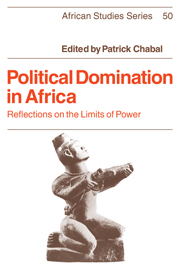Book contents
- Frontmatter
- Contents
- Acknowledgements
- Introduction: Thinking about politics in Africa
- 1 Democracy in Africa
- 2 Politics and vision in Africa: the interplay of domination, equality and liberty
- 3 Democracy and ethnocentrism
- 4 Wails and whispers: the people's voice in West African Muslim politics
- 5 Revolutionary democracy in Africa: the case of Guinea-Bissau
- 6 Civil society in Africa
- 7 Political accountability in African history
- 8 The politics of representation and good government in post-colonial Africa
- Notes
- Index
3 - Democracy and ethnocentrism
Published online by Cambridge University Press: 26 January 2010
- Frontmatter
- Contents
- Acknowledgements
- Introduction: Thinking about politics in Africa
- 1 Democracy in Africa
- 2 Politics and vision in Africa: the interplay of domination, equality and liberty
- 3 Democracy and ethnocentrism
- 4 Wails and whispers: the people's voice in West African Muslim politics
- 5 Revolutionary democracy in Africa: the case of Guinea-Bissau
- 6 Civil society in Africa
- 7 Political accountability in African history
- 8 The politics of representation and good government in post-colonial Africa
- Notes
- Index
Summary
Sklar's paper in this volume will inevitably provoke the criticism that his conception of democracy is ethnocentric. For more than a decade, indeed, Third World scholars have been lambasting their counterparts in Western Europe and North America for ‘ethnocentrism’ and ‘cultural imperialism’, and usually the charge has been accepted quite meekly. I shall argue, however, that not only is the criticism rather stale, but it has in fact always been question-begging and shallow. Further, if we look closely at the premises implicit in the criticism, they often reveal a double standard: a denunciation of the intellectual nationalism of others and an exaltation of intellectual nationalism (indeed, protectionism) nearer to home, in Africa, Asia and Latin America. Lastly, the criticism itself, set against the variety of Western writings on (in this case) Africa, is indiscriminate, in specifics unfair and inaccurate, and in methodology confused.
This argument does not mean that any critique of ethnocentrism is groundless or that the term itself is without meaning. Nor does it imply that the indignation of Third World scholars is always unjustified or exaggerated. Indeed, it is only necessary to read quickly through Sklar's chapter to experience again the irritants which have so inflamed African nationalists. The very clarity and self-confidence of the paper illuminate the features of American liberal evangelism that both attract and repel. On the one hand, they highlight its robustly egalitarian approach to the world and its expansive, energetic involvement in international affairs. On the other hand, these features make for a no doubt unintended sense of indifference to the cultural and intellectual claims of nationalism, as well as a sense of telling others what is good for them.
- Type
- Chapter
- Information
- Political Domination in Africa , pp. 52 - 70Publisher: Cambridge University PressPrint publication year: 1986
- 3
- Cited by

